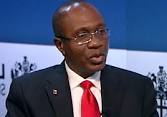AT the recent Financial Times Africa Summit in London Governor of the Central Bank of Nigeria (CBN) Mr Godwin Emefiele, defended his foreign exchange policy, which has tended towards administrative controls since the begining of this year. He had contended that the policy had so far ensured relative stability in the foreign exchange market and the value of the Naira against major world currencies.
But foreign investors and the international media disagree, claiming that the perceived stability is a myth and indicating that trouble lies on the horizon.
CBN’s effort at administrative foreign exchange management obviously signposts much deeper problems in the economy, the major one being the weakening of the external reserve and foreign exchange supply gaps. The consequence is that businesses are going through untold hardship, and the economy could plunge deeper towards recession.
The CBN is sticking to its administrative management strategy where it determines both exchange rates and supply. By this, the Bank believes it would curtail unwholesome demands for foreign exchange while protecting the Naira and the nation’s foreign reserves from free fall. But foreign investors are of the view that market forces should determine both the demand and supply, and ultimately the value of the Naira so as to avoid arbitraging and economic distortions.
The CBN obviously has the best interest of Nigerians in its policy. The concern for Nigeria’s interest as against external interest is natural but we need to diagnose those external interests to see if they are really anti-Nigeria. Of concern is the impact of devaluation of the Naira on the economy and the livelihood of the average citizen.
A free market foreign exchange policy may put pressure on the external reserves and exchange rate. A devalued Naira would mean increased inflation and cost of living.
However, classical monetary economists would also argue that a devalued local currency would discourage imports while giving impetus to exports. But this would be to the advantage of an economy that has a manufacturing base and Nigeria is obviously not such yet.
The current administrative strategy appears to be giving a temporary and even false sense of security whereas in reality it is not sustainable over a reasonable period of time, especially against Nigeria’s troubling oil revenue profile.
As a matter of fact the protective policy has forced CBN to be the only supplier of foreign exchange in the market and this is already putting the foreign reserve on steady decline thereby defeating the very objective of the policy.
We advise CBN to explore economic trajectories that are more open to alternative courses of action. We urge it to periodically reappraise the protectionist policy, stimulate inter-bank foreign exchange trade and support real sector development.
END


Be the first to comment